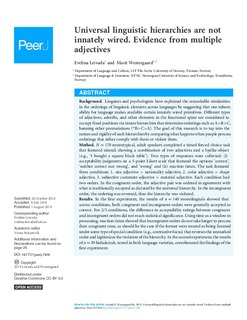| dc.description.abstract | Background. Linguists and psychologists have explained the remarkable similarities in the orderings of linguistic elements across languages by suggesting that our inborn ability for language makes available certain innately wired primitives. Different types of adjectives, adverbs, and other elements in the functional spine are considered to occupy fixed positions via innate hierarchies that determine orderings such as A>B>C, banning other permutations (*B>C>A). The goal of this research is to tap into the nature and rigidity of such hierarchies by comparing what happens when people process orderings that either comply with them or violate them. Method. N D170 neurotypical, adult speakers completed a timed forced choice task that featured stimuli showing a combination of two adjectives and a Spelke-object (e.g., `I bought a square black table'). Two types of responses were collected: (i) acceptability judgments on a 3-point Likert scale that featured the options `correct',`neither correct nor wrong', and `wrong' and (ii) reaction times. The task featured three conditions: 1. size adjective > nationality adjective, 2. color adjective > shape adjective, 3. subjective comment adjective > material adjective. Each condition had two orders. In the congruent order, the adjective pair was ordered in agreement with what is traditionally accepted as dictated by the universal hierarchy. In the incongruent order, the ordering was reversed, thus the hierarchy was violated. Results. In the first experiment, the results of n D 140 monolinguals showed that across conditions, both congruent and incongruent orders were generally accepted as correct. For 2/3 conditions, the difference in acceptability ratings between congruent and incongruent orders did not reach statistical significance. Using time as a window to processing, reaction times showed that incongruent orders do not take longer to process than congruent ones, as should be the case if the former were treated as being licensed under some type of special condition (e.g., contrastive focus) that reverses the unmarked order and legitimizes the violation of the hierarchy. In the second experiment, the results of nD30 bidialectals, tested in both language varieties, corroborated the findings of the first experiment. Conclusions. Our findings do not provide evidence for an innate hierarchy for adjective ordering that imposes one rigid, unmarked order. We discuss the importance of notions such as subjectivity and inherentness, and show that for some conditions, not only is there no evidence for a hard constraint that bans incongruent orders, but even simple preferences of congruent orders over incongruent ones are hard to discern. Capturing the bigger picture, given that both the hierarchies and their legit permutations have been described as innate, our results reduce the amount of primitives that are cast as innate, eventually offering a deflationist approach to human linguistic cognition. | nb_NO |

